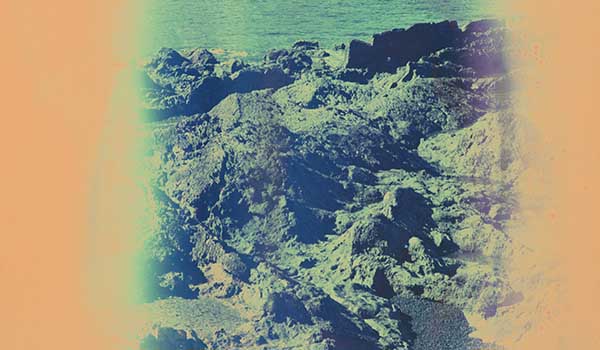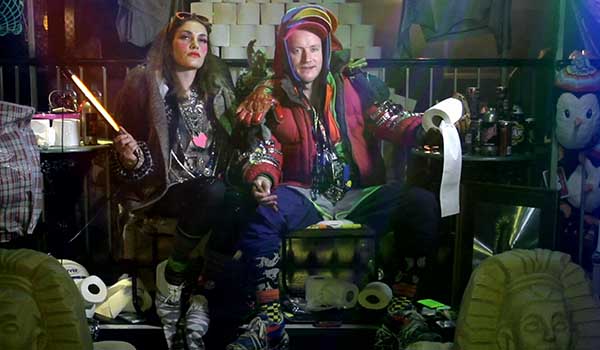Titled Great Tricks From Your Future and curated by Mai Abu El-Dahab, the multi-disciplinary project includes an ongoing exhibit, that opened 16 March and runs until 12 April at the Old French Consulate, and a performance night, which took place on 21 March.
Abu El-Dahab is an international freelance curator known in the field since the late 1990s. Recently co-curator of the Liverpool Biennial of 2014, she was director of the non-profit art space Objectif Exhibitions in Antwerp, where she curated over ten solo exhibits.
Abu El-Dahab has also edited and co-edited several publications by the Sternberg Press, including Hassan Khan: The Agreement.
The event, which includes several Egyptian and international artists, is part of the Downtown Contemporary Arts Festival (DCAF). According to the statement released, the ongoing display and the performance night explores narratives, with each artist creating their own language offering a way of dealing with the present, or creating an altered reality.
The Broken Narrative
The plan was to find the exhibition space, with works by Basim Magdy and collaborating artists Basel and Rouanne infused with the five performances on 21 March.
However, a last minute change of venue saw the disconnection of the event's components and the performance night was moved to the 100copies music space, instead of the Old French Consulate where the exhibition was on display.
As such, the performances on 21 March were physically and contextually isolated from the other works in the exhibition.
“All the works are really about how to grasp what can be called reality,” Abu El-Dahab, commented to Ahram Online.
According to Abu El-Dahab, the sudden decision to disconnect the event's components was not a curatorial move, but came as a solution. “In the end I had no choice,” she said, without going into further explanation.
“There is a negative side of this separation, and it would have been more charming to have the performances at the French Consulate," she agrees before exploring the positive aspects of the performance part being at 100Copies, a music label based in Cairo, founded and managed by Mahmoud Refat, also DCAF's music section curator.
Exhibition at the Old French Consulate
Abu El-Dahab’s curatorial credit however remains apparent in the exhibit held at the Old Consulate, where the artwork on display extends towards the location's both wings. Basim Magdy and a Palestinian duo, Basel and Rouanne, present solo exhibits which according to Abu El-Dahab need to be approached each in its own distinctive manner.
Basel and Rouanne offer a video piece and an installation; both displays act as parts of the same project titled Incidental Insurgents, divided into two parts.
The Part About the Bandits is a mixed media installation set in a room resembling the artists’ working studio, with research images tacked to the walls. Part II, Unforgiving Years, features a projected video in which we see two men with their backs to the camera, moving and driving around a ruined and deserted city, like caged lions.
A narrative text hints at a story of entrapment, the pace of the text and the music in an exciting contrast with the uneventful visuals.
In the other wing, Basim Magdy offers two video and two photographic projects.
His video My Father Looks for an Honest City was created in the year 2010, right before the revolution. And interestingly enough could be a premonition, in retrospect falling in line with Magdy’s interest in dealing with the future.
Without addressing a specific place and time, the artist comments to Ahram Online that he actually goes out of his way to create places that are imaginary, yet feel familiar, and where he can explore absurdity in real time.
My Father Looks for an Honest City is Magdy’s encounter with an absurd moment in the history of philosophy, a story of the little known philosopher Diogenes of Sinope who roamed the streets in broad daylight with a lit lantern, looking for an honest man.
Magdy’s photography project Investigating the Color Spectrum of a Post-Apocalyptic Future Landscape is displayed in a room on a carousel slide-projector. In this work the artist took a trip to the future, recorded the earth’s landscape post-apocalypse, and returned with 80 images.
The photos are treated with Magdy’s technique of “pickling films,” where he exposes the film rolls in vinegar and household chemicals, the reaction causing loss of detail, leaks, and a wash of color across the film.
Weather he is imagining the future or exploring the absurdities of the present, time always plays a supporting role in Magdy’s artwork.
His second film on display titled A Film About the Way Things Are, marks the first project Magdy incorporated his interest in poetry with his artwork. His prose narrates ambiguous visuals, with shots that evoke a visual travel journal.

Basim Magdy's Investigating the Color Spectrum of a Post-Apocalyptic Future Landscape (Photo: courtesy of DCAF)
Meanwhile at 100 Copies
In another surreal narrative, on 21 March, the performance night kicked off at 100 Copies by screening Welsh artist Bedwyr Williams’ film, with its dystopian storyline, titled Echt.
“This idea of ephemeral events and live interaction with the audience is something that I like and work with a lot,” says Abu El-Dahab, underlining the distinction of the performance night in parallel to the ongoing exhibit.
Echt portrays a twisted world of consumption, where hoarders are kings who absurdly wear everything they own to affirm their social status.
“I think this film is very pertinent to Cairo, and it really points to this idea of how one chooses to see reality,” Abu El-Dahab says. The film offers a view on a society gone astray, being driven by materialism and meaningless rituals, yet it maintains a humorous tone alongside the disturbing and sometimes-repulsive scenes in the dystopia.
After the screening came a performance by Jochen Dehn, offering a class on invisibility, part of his long-term project The School for Invisibility. Dehn explained to the audience as he would to a group of friends that the class will walk them though “How to be invisible,” but to achieve that, he will actually address distraction and how to divert attention.
“He uses language to alter the perception of what you’re seeing. He’s not really performing the magic trick, he is explaining it, I think the connection with language and narratives is very strong here,” Abu El-Dahab says.
Dehn, though keeping some of the audience engaged by his easy manner and others intrigued by his claims to teach magic, somehow lacked a clear direction and climax in delivering his points, and a number of people started leaving mid-way through the class.
“But there are other artists after this!” he shouts, in good humour, after a member of the audience left.
The third performance featured collaborative sound artists Stine Janvin Motland and C Spencer Yeh, with electro acoustic music produced with layering vocal sounds.
The duo created their own language, owning up to the statement, as they stretch the limits of experimenting with human sound in contact with electric equipment, creating an improvised cacophony of noise.
Closing the evening with another musical performance was French artist Benjamin Seror. By merging epic stories with pop, upbeat music, Seror can be best described as a contemporary musical storyteller. His performance The Marsyas Hour included a number of songs, with Seror singing, playing the guitar and the keyboard to deliver the story of Marsyas who is said to have challenged the Greek god of music Apollo.

Still from Bedwyr Williams' video Echt (Photo: courtesy of DCAF)
Short link: